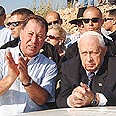
Sharon tours Ariel
צילום: לע"מ
Sharon woos rightists
In interview with French newspaper, prime minister speaks of plans to boost West Bank settlements, says he does not intend to discuss partition of Jerusalem; Sharon also calls on international community to impose sanctions on Iran
TEL AVIV – Expanding the West Bank settlement of Ariel, creating a contiguous territorial connection between the town and the Green Line, and constructing new homes in the settlement of Maale Adumim– those are only some of the objectives singled out by Prime Minister Ariel Sharon during a tour of Ariel Thursday and an interview with French Newspaper Le Figaro to be published Friday.
During his visit to Ariel, Sharon said: "I came to check how we can expand the town…this (settlement) bloc will forever be an inseparable part of the State of Israel and enjoy a contiguous territorial connection to it."
Political sources promptly attributed Sharon's tour to the fact Finance Minister Benjamin Netanyahu, Sharon's main rival for Likud party leadership, convened a meeting of the social-economic cabinet in the Jordan Rift Valley in the West Bank.
However, sources at Sharon's office dismissed the suggestion and said the prime minister's tour was scheduled about a month and a half ago, following the government's decision to establish a university in Ariel.
"With all due respect to Netanyahu's tours and visits to the Jordan Rift Valley, the prime minister doesn't schedule his tours in accordance with those conducted by the finance minister," one Sharon associate said.
'Bible more powerful than any political document'
Meanwhile, Sharon also addressed talk of dividing Jerusalem and pledged to refrain from ever doing so.
"I hear Knesset members who talk about dividing Jerusalem. I don't even intend to discuss Jerusalem," he said. "Even those who incite know it's a lie."
However, expanding Ariel is apparently only the beginning, according to Sharon.
"There must be no mistake about it – we will forever sit in Maaleh Adumim," he told Le Figaro. "The southern section of the territories, Judea, will never be disconnected from the northern section, Samaria. There are several ways to solve this problem."
The prime minister also noted that the West Bank security fence currently under construction does not mark the final-status border between Israel and the Palestinians.
"The bible is more powerful than any political document," Sharon said. "We mustn't forget that the territories, and particularly Judea and Samaria, are the cradle of Judaism."
When asked whether he will refuse to evacuate Jewish communities such as the one in Hebron, Sharon replied: "Hebron is a holy city in Judaism. What other nations have forefathers buried in Hebron such as Abraham, Sarah, Jacob, Isaac, Rebecca, and Leah?
Sharon wants sanctions on Iran
However, Sharon also expressed his hope that the disengagement plan would break the way for the road map peace initiative.
"The disengagement plan is a very important move for Israel," he said. "It would be able to…break the way for the road map, of course under the condition that the Palestinians start addressing terrorism."
Sharon called on the international community to "exert genuine pressure on the Palestinians so they stop the violence completely." He also called for significant reforms in all Palestinian security apparatuses and the dismantlement of terror groups.
Regarding the Iranian threat, the prime minister said the international community should impose sanctions on Iran to prevent it from developing nuclear weapons. Economic sanctions could be the first step and should be imposed immediately, even without waiting for a U.N. Security Council resolution on the matter, he said.
Europe must complete its negotiations with Teheran as soon as possible, Sharon stressed.
"We cannot tolerate the possibility of Iran turning into a nuclear state," he said. "A nuclear Iran would constitute first of all a tangible danger to Israel, and also jeopardize the Middle East and Europe."
-Attila Somfalvi, Ronen Bodoni, and Diana Bahur-Nir also contributed to the report










